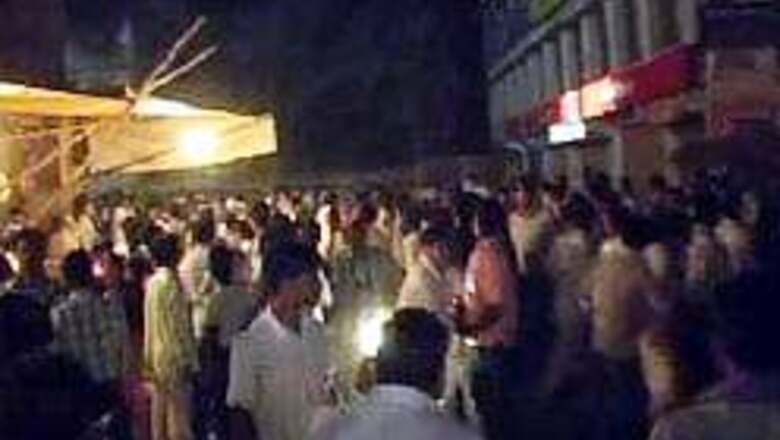
views
New Delhi: A little-known Islamic militant group, Lashkar-e-Kahar (the Army of the Imperious), has claimed responsibility for the Tuesday blasts in the temple town of Varanasi.
In a telephone call to Current News Service (CNS), Abdul Jabbar alias Abu Kahar - who identified himself as the spokesman for the group – said the outfit carried out the blasts, which killed 23 people. "We have carried out the attacks," he said.
He also warned that the outfit would carry out more attacks if "India does not stop atrocities against Kashmiri Muslims. Until that happens, we will not allow people of India to live in peace."
Meanwhile, Home Secretary Alok Sinha has said, "The Benaras bombs were made in Patna. Bihar government tipped off the Patna Police."
![]() The Pakistan Army, particularly in the borders with India (the International Border and the Line of Control - LoC) also aids members of the outfit in their infiltration, exfiltration and clashes with Indian security forces near the borders by providing covering fire.
The Pakistan Army, particularly in the borders with India (the International Border and the Line of Control - LoC) also aids members of the outfit in their infiltration, exfiltration and clashes with Indian security forces near the borders by providing covering fire.
![]() While the primary area of operations of the Lashkar-e-Toiba’s terrorist activities is the Kashmir valley, the outfit is also active in the Jammu region besides having undertaken isolated attacks in other parts of India.
While the primary area of operations of the Lashkar-e-Toiba’s terrorist activities is the Kashmir valley, the outfit is also active in the Jammu region besides having undertaken isolated attacks in other parts of India.
![]() The Lashkar is reported to have conducted several of its major operations in tandem with the Hizb-ul-Mujahideen. The Kashmiri cadre of the HM provide vital knowledge of the ground conditions in the target zone, while the highly trained and motivated LeT mercenaries undertake the attack.
The Lashkar is reported to have conducted several of its major operations in tandem with the Hizb-ul-Mujahideen. The Kashmiri cadre of the HM provide vital knowledge of the ground conditions in the target zone, while the highly trained and motivated LeT mercenaries undertake the attack.
![]() LeT cadres, unlike other terrorists, are known to prefer death in an encounter with the security forces rather than be arrested.
LeT cadres, unlike other terrorists, are known to prefer death in an encounter with the security forces rather than be arrested.
![]() Lashkar-e-Toiba is at present busy expanding and consolidating its network within Pakistan and outside, including India. At present, Lashkar runs about 20 madrasas and 30 schools in Sindh.
Lashkar-e-Toiba is at present busy expanding and consolidating its network within Pakistan and outside, including India. At present, Lashkar runs about 20 madrasas and 30 schools in Sindh.
(source: www.satp.org)
Police said they had never heard of the group before, but were taking the call seriously and had started investigations.
Interestingly, the police had earlier pointed fingers towards the Lashkar-e-Toiba, another Islamic outfit, after taking into account various factors like use of RDX in the blasts and also the modus operandi of the attack.
Police sources had claimed that electronic surveillance of the site suggested link of LeT to the attacks.
Investigators have already confirmed that RDX was used in the attacks. The explosives were believed to have been brought in from Bihar after being smuggled in through the Indo-Nepal border.
Earlier, after examining the blast site forensic scientists had said that Ammonium Nitrate was used in the attacks
Forensic experts are also understood to be looking at the similarities between the Varanasi blasts and the explosion on board the Shramjeevi Express near Varanasi on July 28 last year.
Ammonium Nitrate, which is readily available in the old market places of major cities, is believed to have been packed in pressure cookers, which when explodes, shatters into splinters, magnifying the impact.
PAGE_BREAK
Electric current is passed into the explosive material using batteries to generate sparks before it sputters and explodes with a bang.
The explosion caused by Ammonium Nitrate is more lethal than RDX as it is packed in a pressurised steel body that gets blown into deadly shrapnels.
On Wednesday, a Special Task Force of UP police had gunned down a suspected terrorist, believed to be a member of Lashkar-e-Toida, a an encounter in the Goasaiganj area of Lucknow in the wee hours.
Jammu and Kashmir Police identified the slain militant as Dr Majeed, also known as Salar alias Masalewala, and claimed that he was the mastermind behind the Varanasi blasts.
"It was a well-coordinated encounter by the UP Police. The terrorist killed is Dr Majeed who was trained in Rawalpindi in Pakistan. He was a resident of Ratlam district of Madhya Pradesh and was the Commander of the militant outfit Harkatul Ansar. We were looking for him for the past few months," Inspector General of J&K Police, K Rajendran said.
The J&K police also claim that Majeed had close links with terrorists in Delhi and Uttar Pradesh.




















Comments
0 comment